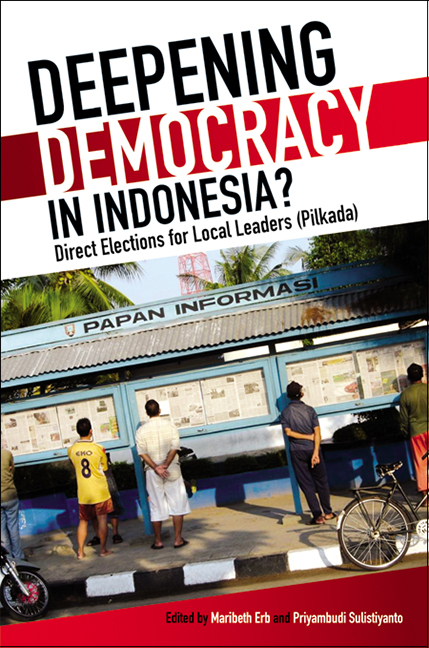Book contents
- Frontmatter
- Dedication
- Contents
- List of Tables
- List of Figures
- Contributors
- Acknowledgements
- Glossary
- 1 Indonesia and the Quest for “Democracy”
- 2 Pilkada Langsung: The First Step on the Long Road to a Dualistic Provincial and District Government
- Part I Political Parties, Politician Elites and the Voters
- Part II Media and Campaigns: Comparing Local and National Elections
- Part III Conflict, Ethnicity, and Political Divisions
- 12 Autonomy, Democracy, and Internal Conflict: The 2006 Gubernatorial Elections in Papua
- 13 Conflict and the Growth of Democracy in Manggarai District
- 14 The Return of the Sultan? Patronage, Power, and Political Machines in “Post”-Conflict North Maluku
- 15 Ethnic Politics and the Rise of the Dayak-Bureaucrats in Local Elections: Pilkada in Six Kabupaten in West Kalimantan
- 16 Bare-Chested Politics in Central Sulawesi: Local Elections in a Post-Conflict Region
- Index
14 - The Return of the Sultan? Patronage, Power, and Political Machines in “Post”-Conflict North Maluku
from Part III - Conflict, Ethnicity, and Political Divisions
Published online by Cambridge University Press: 21 October 2015
- Frontmatter
- Dedication
- Contents
- List of Tables
- List of Figures
- Contributors
- Acknowledgements
- Glossary
- 1 Indonesia and the Quest for “Democracy”
- 2 Pilkada Langsung: The First Step on the Long Road to a Dualistic Provincial and District Government
- Part I Political Parties, Politician Elites and the Voters
- Part II Media and Campaigns: Comparing Local and National Elections
- Part III Conflict, Ethnicity, and Political Divisions
- 12 Autonomy, Democracy, and Internal Conflict: The 2006 Gubernatorial Elections in Papua
- 13 Conflict and the Growth of Democracy in Manggarai District
- 14 The Return of the Sultan? Patronage, Power, and Political Machines in “Post”-Conflict North Maluku
- 15 Ethnic Politics and the Rise of the Dayak-Bureaucrats in Local Elections: Pilkada in Six Kabupaten in West Kalimantan
- 16 Bare-Chested Politics in Central Sulawesi: Local Elections in a Post-Conflict Region
- Index
Summary
“The old is dying and the new cannot be born; in this interregnum there arises a great diversity of morbid symptoms.” Antonio Gramsci, Prison Notebooks
PROLOGUE
Let me start with a snapshot of the Ternate monarch, Sultan Haji Mudaffar Shah II, in July 2005. The Sultan sat in the cool yellow reception room of his fading tropical palace, perched on the slopes of Gamalama volcano, with a breeze flowing in from the Maluku Sea. Elderly male servants in sarongs approached silently on their knees, as is the style in an Indonesian kraton (palace), to serve tea and cakes on antique Dutch china. Outside, from the palace gardens, the cries from his wife's political campaign team at a rally boomed from huge loudspeakers to a gathered mob of supporters. In 1999, the Sultan launched an active campaign to return North Maluku to the preindependence governance system of the Sultanate. Putting forward his wife to run for mayor — a position too lowly for the Sultan himself — was the latest step in the kraton's campaign. According to the Sultan,
The Ternate Sultanate is over 1,000 years old. The problem here now is that the system of government has become so centralised, so Javanese. The Ternate community is very confused with that. They don't understand the terms of government. If we can return to traditional values this can unify the people, because the people understand these values, they are their values.
As it approached midday, Boki (Queen) Nita, the Sultan's fifth and youngest wife, returned from her campaign rally to accompany the Sultan to lunch. The Queen was about to fly to Jakarta, where she had meetings with the national press to discuss alleged corruption in the Ternate elections. Although she had just lost the local elections by over 25 per cent of the vote to the popular incumbent, Syamsir Amas, a long-standing local bureaucrat, Boki Nita would not accept the result. This Javanese princess, now a North Malukan Queen, was determined to take up her seat in the Mayor's office by September 2005. As she departed, she said, “I am the Queen of Ternate and I will be Mayor, these are the true facts.” Unfortunately for the Queen, this was not to be the case.
- Type
- Chapter
- Information
- Deepening Democracy in Indonesia?Direct Elections for Local Leaders (Pilkada), pp. 303 - 326Publisher: ISEAS–Yusof Ishak InstitutePrint publication year: 2009

